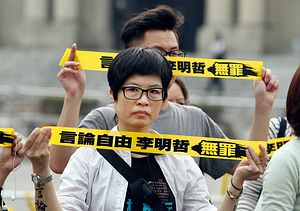In late October, a major news story broke in Japan. According to the news, a modern Chinese history professor from Hokkaido University was detained in China on charges of violating domestic law. In fact, he had been detained in early September, and Chinese authorities subsequently issued a gag order before the media reported on the detention. The Japanese government did not confirm that the detainee was a professor at Hokkaido University, but did acknowledge that a man in his forties had been detained and said that it was providing consular assistance.
The professor, a specialist in the history of the Second Sino-Japanese War, had in the past worked for the National Institute for Defense Studies, part of the Ministry of Defense, as well as the Ministry of Foreign Affairs. In this sense, he does have a government-related background, but he is a researcher working in academia, rather than in policy. He was visiting China at the behest of the Institute of Modern History at the Chinese Academy of Social Sciences, where he was scheduled to lecture. The professor had given a lecture at the same time last year as well, at the invitation of the institute.
In a press conference, China’s Ministry of Foreign Affairs was at pains to stress that the professor had been detained in violation of domestic law, suggesting that the detention had been led by the Ministry of State Security. Following this announcement, Japanese media reported that the professor had been detained on suspicion of spying on the basis of the Counter-Espionage Law. If this report is correct, prosecution can be expected in early February 2020. In this situation, Japanese Prime Minister Shinzo Abe, Foreign Minister Taro Kano and other members of the Cabinet called on Wang Qishan, the Vice President of the People’s Republic of China, who was visiting Japan for the ceremony to enthrone the country’s new Emperor, to help resolve the problem.
The detention of the professor has had a major impact on academic circles, especially among China researchers, prompting some to cancel plans to travel to China. In addition, leading newspapers ran critical editorials, which in turn has had a broader social impact. China may well have been seeking more cordial relations with Japan ahead of Xi Jinping’s scheduled visit next spring. But the mood in Japan is now decidedly chilly.
This was the first ever detention of a Japanese professor. However, in 2013, Zhu Jianrong, a Japan-based Chinese researcher, was detained for about six months and several other Chinese researchers have been detained for periods of several weeks. In this context, it can be expected that another Japanese scholar may one day again be arrested in China. Meanwhile, 13 businesspeople are known to have been detained. Some have been released after diplomatic negotiations, but nine were prosecuted. With the enactment of the Counter-Espionage Law and the 2015 National Security Law, the Xi Administration is tightening its control and supervision over visitors, including people from Taiwan and Hong Kong who are living in or visiting China.
According to Taiwanese media, about 150 Taiwanese have disappeared in China in the last few years, and some university professors have been detained recently for alleged national security reasons. There have also been widespread media reports in the West of Americans, Canadians and Australians being held in custody.
Why does the Ministry of State Security detain foreign researchers? Of course, any detention may be a retaliatory measure, at a time when quite a few Chinese are suspected overseas of spying and information-gathering amid the confrontation between the United States and China. Or perhaps it’s the clampdown on speech and thought that has taken place under the Xi Administration, which that also affects Taiwanese and others visiting mainland China on short or long term stays. After Xi came to power, legislation governing foreign NGOs working in China was introduced. At the same time, the Chinese government is trying to set up Communist Party organizations within foreign companies, while tighter control and increasing surveillance of citizens has already affected foreign organizations and foreigners in China. A considerable number of China-based Taiwanese university professors have decided to work in China due to preferential policies that the Chinese have provided for Taiwanese, like the so-called 31 Measures for Taiwan. But once beginning to teach in China, they have faced tightened surveillance by Communist Party bureaus within universities and local public security bureaus. In addition, authorities have kept tabs on Chinese university professors planning to travel abroad and participate in academic conferences. Their classes were also under video surveillance and students have reported professors to Communist Party bureaus within universities. These activities have also included Chinese students studying overseas and the words and actions of professors at foreign universities have allegedly been reported to local diplomatic establishments.
Given this situation, it seems clear that the detention of professors and other foreigners in China is part of the country’s clampdown on speech and thought. As such, it represents not only a serious challenge to the global freedom of education, but may be the process by which Chinese standards of free speech and thought spread from China to the rest of the world. If this situation continues, it could affect not only academic interactions with China but also everyday cultural interactions, and ultimately economic activity.
China professes itself to be a country of laws, and ostensibly also accepts the concept of the rule of law. But China’s interpretation differs from that more typically adopted by the West. The application of laws within China naturally comes under its sovereignty. Nonetheless, arbitrary application will ultimately hinder economic and cultural activities. The question is whether the international community can do anything about it.
Shin Kawashima is a professor at the University of Tokyo.

































